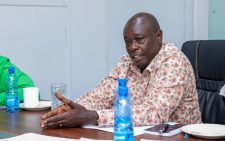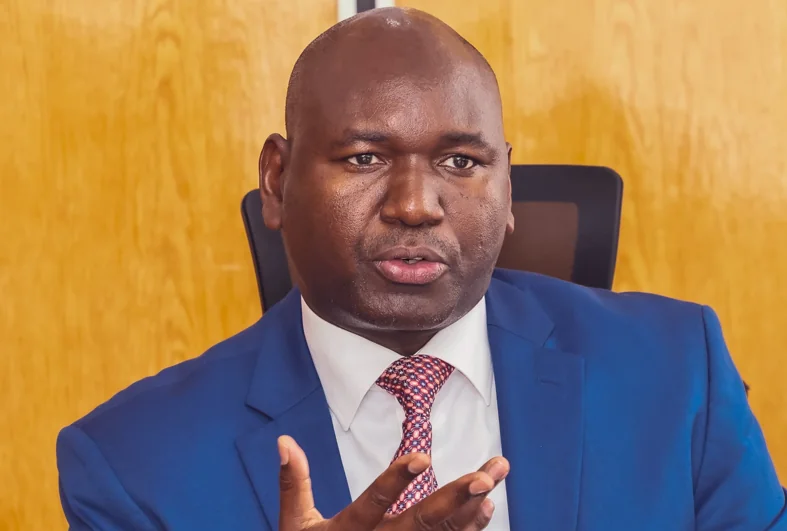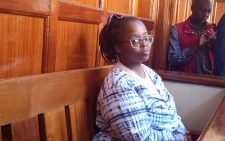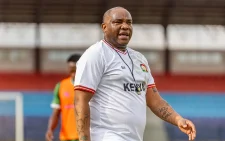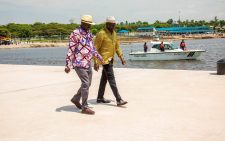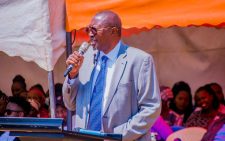‘Wee kaa ngumu’, Uhuru told Issack amidst intense pressure by Raila
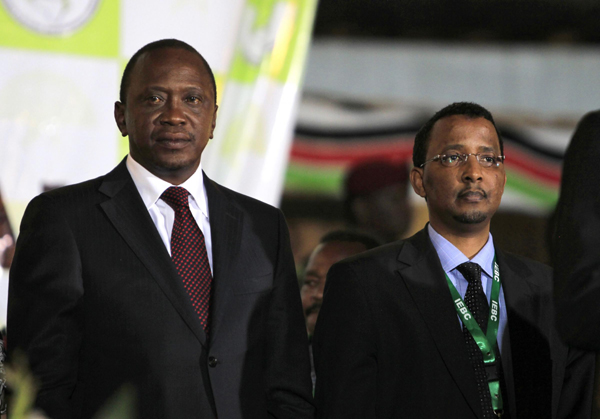
After being away in the US for three months from March to May 2014, Raila (Odinga) returned to a rousing welcome and a trending hashtag, ‘Baba while you were away’.
It quickly gained traction on social media. Kenyans, in their ever-comical ways, used the hashtag to let him know what had happened in the country in his absence, but always with humorous twists to the updates. He held a massive homecoming rally at a jam-packed Uhuru Park in the city centre.
He demanded to have a national dialogue to discuss insecurity and corruption in the country within 60 days, promising that he would keep the Jubilee government on its toes from there on. He let the mammoth crowd know that he would be holding countrywide rallies on the issues he had raised. In addition, he called for the disbandment of the IEBC in a statement, ‘I want to see peace return to our country, and the IEBC must go home.’ The phrase, ‘IEBC must go’ became CORD’s new campaign slogan. Charged by the speeches made by CORD leaders, the crowd joined in the chant about IEBC going home. CORD was determined to use any means within their reach to ensure we left office. It may have seemed like a passing statement, but the weight of those words was about to fall on the entire commission, one brick at a time. The brewing trouble was just warming up. It became the genesis of most of our woes from there on, and the nemesis for everything we had worked so hard to build from the ground up.
The effect of those words was not lost on me. Whatever Raila said acquired a life of its own through a well-oiled machinery, comprising loyal, sycophantic, and unquestioning followers. This group sprang into action to execute his bidding, both directly and indirectly. His pawns in the mission included the civil society, politicians in and out of Parliament, government officials, and everyone else that could play this part for and on his behalf. I contemplated deeply about walking away from my job. I was already convicted in the public court and found guilty of every false allegation Raila and the CORD brigade had made. I needed to hold it together and ensure I set the record straight before I left.
Avalanche of anger
I was not too sure how to do that effectively, but I was hoping I could make the exit as soon as the post-election evaluation exercise and report were completed. I was convinced that as a result of all the attacks, I would end up as a scapegoat, so I hoped to get a head start. I decided that I would let the President know about my desire to walk away. I called Ambassador Amina (Mohamed), who was then the Minister for Foreign Affairs, to discuss the matter then visited her home to explain what was on my mind. I requested her to accompany me to see the President so I could relay my concerns to him. Our meeting took place on a Saturday morning and the President listened as I presented my case. I felt aggrieved that the commission was an open target, daily receiving blows that CORD was in the real sense aiming at the government. Having announced him as the winner, the commission was now the soft target for CORD’s avalanche of anger and barrage of resentment against the Jubilee government. CORD wanted to use IEBC as the pressure point for their frustrations after losing the election.
I had no way of countering all their attacks from an individual standpoint, and felt the commission and I were exposed to an opponent that was way bigger than all our efforts combined. The heaviest blows kept a sharp target on me, mainly because I declared him as President. I was ready to quit.
“I don’t think you should do that, Chairman,” the President said after listening to me. “You are going to confirm everything they are saying. I will not support you in this. No, you cannot go now. You have to stay and finish the work you have been given. Wee kaa ngumu,” he said, urging me to stay put. “And Amina, stop encouraging Ahmed on this.”
The President’s confirmation was clear. He would not accept my resignation. That did not go as I had planned, so I tried again. I was glad he concurred with me, that I had done nothing to deserve all the backlash, since I was only doing my job. I pointed out to
him, however, that the commission was beginning to crack under the weight of the pressure that was being unduly piled on us. He promised that he would look into it and see what to do.
A few hours after the meeting, I received a call from the spy chief, Michael Gichangi.
“Chairman, you cannot even think of resigning,” he said. “You know, nothing much would happen if I decided to resign today. It’s a different ballgame if you, on the other hand, step down. Just listen to the President’s advice and stay put.”
There was little I could do, so I archived the matter for a while and got back into the grind. I did not need anyone’s permission or consent to resign. I decided, however, to consult with the President so as not to appear to be confrontational, and to avoid ambushing him. It was also a strategic move. I was already in the crosshairs of the opposition, CORD, and I did not want to add the ruling party in government to the list.
Unfortunately, I fell ill again around this time. A sharp pain coursed through my back after I heard it snap while preparing myself for work early one morning. I was in excruciating pain. Still, I went ahead and finished my prayers, then called the doctor as I got into the car. The doctor urged me to immediately get to the hospital. On arrival at Karen Hospital, I was unable to walk by myself as the pain had intensified. I had to be wheeled in on a stretcher. The doctor immediately injected me with morphine to numb the blinding pain as they ran X-rays and other tests. The results revealed that I had suffered multiple disc prolapses.
A couple of people must have seen me being wheeled in, and soon enough, word spread on social media that I was seriously sick and in hospital. I had no clue what was going round and only got to find out much later.
One of the posts read, ‘Issack Hassan has a heart attack, and his family is now taking him to the hospital where the late Kijana Wamalwa died.’ Karen Hospital was known as a premier place for patients with heart conditions, hence the rumour.
Another, supposedly in sympathy, wrote, ‘the family has lost hope, they are now looking for a possible place to bury him when he dies.’
Every innuendo found a corresponding response from the ever-eager social media crowd, and it morphed within a short time into a blown-up version of the actual condition I was in.
My wife came to see me at the hospital, and just so I could get some rest as the doctor had ordered, she took my phone with her until I could recuperate.
The rumour mills
When I got back home after being discharged, I found numerous missed calls and hundreds of messages on my phone. A number of the missed calls were from people outside the country who were worried and concerned about my health. They had learnt of my ill health and were checking on me to find out how I was faring.
They got even more worried when all their calls went unanswered for an unusually long time. I was shocked at the messages I received from those who forwarded me screenshots and links on the grapevine. Some of the messages were thoughtful while others were downright cruel and spiteful. Others honestly believed I had died and started euologising me, saying ‘he was a good man who had done a good job for the country.’
Another one going round read: ‘IEBC chairman has been out of the limelight for some time, but Uhondo254 can now reveal that he is admitted at an ICU in a Holland hospital.
According to a source who happens to be a close family member, ‘the no-nonsense IEBC boss has failed to positively react to medication. This is despite being under the care of some of the best doctors in the world. The safe-guarded source further reveals that his family members are already preparing a grave for the IEBC boss in accordance with his written wish. It’s so unfortunate that the fatal heart condition of the IEBC boss has eaten up all his fat bank accounts, and the family is trying to solicit funds from well-wishers. According to the source, Isaac (sic) Hassan has even sold some of his properties at a throw away price so as to settle his huge hospital bills.’
A few people wished me well and a quick recovery. The majority, however, said it was a good riddance, and that I should rot in hell. It was both ridiculous and sobering to see and hear all these messages. It gave a feel of just how deep people’s hatred ran, and the ugly reality stared me in the face as I scrolled through each one of the messages. It was also worrying my mother, whose initial fears about me taking up the IEBC job were now resurfacing. She was constantly receiving perturbing reports and rumours about me.
Her calls to make inquiries on what was going on had increased, as had her worry. I was disturbed by all the madness, but once again, I took more blows to my chin and trudged on. I may have had a slight inkling of what else was coming, but it was the incessant pummeling in every direction I turned, that slowly began to wear out my defences. The dawning of a new reality was in the offing, and my seemingly fortified ramparts began developing cracks.
One morning in June 2014, my wife came to my car with a worried look as she was seeing me off. She asked if I was coming back home that evening. I was confused by her question and asked why she would doubt that I would. Some of her friends had alerted her about a headline in The Star newspaper that morning, indicating that I was going to be jailed before the end of the day.
“What? Who said that?” I asked.
“They are saying that they’re going to arrest you,” she said. “It’s in the newspaper today.”
I was stunned.
“Oh, is that so? I don’t think I will be arrested, but I will look into the matter,” I said as I left, assuring her that everything would be okay.
My wife comes from a political family, though she is mostly reserved, and an introvert. Ordinarily, she is not easily cowed or shaken. However, the wild headlines in the print media about my alleged, impeding arrest shook her to the core.
My first stop that morning was the newspaper vendor, where I got a copy of The Star and read the story for myself before getting to the office. The fabrications and twisted narratives carried by the media had a deep effect on those who consumed the content. The Star, for instance, had perfected the art of sensational journalism. Their stories about me were shaping a narrative they wanted to consistently spoon-feed Kenyans until it became their reality, and they worked hard to provoke negative public sentiments at the expense of the truth.
A thought crossed my mind as I read the newspaper. I wondered if it would be a good time to walk away from everything that I had worked so hard for, and take all the blame in spite of the fact that I knew I was innocent. Maybe this would save the commission from all the disapprobation. I began to believe after that day that the court of public opinion would actually have its way over my fate. I was deeply concerned about the stigma that would follow, with the commission being dragged through the courts once the commissioners and I were out of office.
Bothered family
Thoughts of being suddenly arrested and taken to court surfaced and kept me company for many days. I imagined that maybe one day, security officers from the Director of Public Prosecutions or the Directorate of Criminal Investigations would arrest me, then charge me in court over some trumped-up charges to placate those out to get me. It would take years to prove my innocence, but by then, the damage would already have been done.
In much of the reporting that went on, the media hardly referred to me by my name – Ahmed, and mostly preferred using Issack Hassan, which is my father’s name. It caught the eye of my younger brother Mahat, who, in addition to being incensed at the injustice being meted out to me, felt angered at the reference to our late father. He blurted out one day while at my house as we watched news: “What has my father done? He is dead. The media should just leave him alone!”
My wife shared her worries and concerns with my mother, who then travelled from Garissa to come for a visit the same week. On arrival, my mother informed me that everything that was happening was taking a heavy toll on my siblings and the entire family. Her plea was that I consider resigning. She insisted that she did not want me to be in office by the time the 2017 General Election came around.
Arrested and jailed?
“When are you going to resign? These people seem like they want nothing else other than to persecute you,” she said as we had dinner that evening.
“I will not be persecuted,” I said. “Be assured that I will not be charged because I have done nothing to warrant being charged. I am innocent. However, I will call the President in your presence and tell him that I want to see him. I will mention your concerns and what you’re telling me about my safety, so that I can get his assurance on the matter.”
This seemed to placate her. I took my phone and dialled the President’s number. It was around 8.00 pm.
“Your Excellency, I am here with my wife and my mother who has travelled from Garissa. They are both convinced that I will be persecuted and that I will be arrested and jailed.”
The President indulged me as I went on.
“Do you remember that time your mother held your head and prayed for you at a public rally because of her concern for you, and your safety at the time? The seriousness of that moment for you and your mother is similar to where I find myself today. It’s getting ugly with what is going on, and I would like to come and see you on this matter,” I paused and waited to hear his response.
I was referring to April 2011, when Uhuru Kenyatta, who was then serving as the Deputy Prime Minister, and William Ruto, the MP for Eldoret North, were set to go to The Hague. They held several public rallies before their trip. The particular rally I was referring to was held in his backyard in Gatundu, and it was attended by his political allies as well as his mother, Mama Ngina Kenyatta. At one point, Mama Ngina stood on the platform, spoke directly to her son before the crowd, and then placed her hands on his head as she prayed for him. She also did the same for Ruto.
“Come tomorrow in the evening, Chairman. I’ll see you at 8 O’clock.”
I went to Ambassador Amina’s house the following evening and after a short while, Ranka, the President’s bodyguard came, picked me and we headed for State House.
We had a long conversation as I narrated the concerns my family had over my safety.
“Your Excellency, I have talked to you prior to this about resigning from office, but this time around, I cannot go back without getting your assurance that I will not be persecuted. My family needs to know that I will be okay.”
The President then took his phone, made several calls. Once done, he got back to our conversation.
No cover ups!
“Chairman, the moment you mentioned my mother, I understood what you meant. But don’t worry, hakuna kitu umekula. You are not guilty,” he said, affirming that I had not ‘eaten’ as it were, any bribes and thus was not culpable.
“Your Excellency, I’m not asking you to cover up anything for me. I just want you to assure me that I will not be persecuted because of the pressure from the media, civil society and CORD.”
“It will not happen, Chairman, don’t worry. You can go and assure your mother, wife, and family that that will not happen,” he said.
I had reason to believe that trouble would follow me given the chatter that had been going on in political circles. It was alluded that I had ‘betrayed’ Raila by not being an enabler for him to win the election, yet he had supposedly overseen my rise in career over the years. For starters, he was the chairman of the very first Parliamentary Select Committee (PSC) that interviewed and selected the Constitution of Kenya Review Commission (CKRC) team, where I served as one of the commissioners. Thereafter, as Prime Minister in the coalition government, he, alongside President Kibaki, approved my name and those of the IIEC commissioners in 2009.
He was still serving as Prime Minister in 2011, when IEBC was established, and I remained as the chairperson of the commission. He was thus deeply disappointed that, in the words of his close confidants, he had played a major role in the three positions I had held, yet I ‘betrayed’ him. I had neither played along nor been beholden to the Prime Minister in his quest for the country’s top seat. It was not too farfetched, therefore, to conclude that I was likely to be crucified for this.
I gave the President’s feedback to my mother on getting back home and once again, she seemed pacified. She had a caveat, however. She requested me to promise her that I would not conduct the 2017 General Election. That was her only wish before she went back home the following day. I assured her that I would not, if that was her wish, but that I needed to first make sure that I cleared my name before stepping down.
The appreciation
It happened that the bi-annual conference of the Commonwealth Electoral Network (CEN) was being hosted in Nairobi the following day, 23rd June, 2014. CEN was supported by the Commonwealth Secretariat based in London, and it brought together all the electoral commissions of Commonwealth countries across the world in these bi-annual forums. It was a great honour for Kenya to have been chosen as the host country for the conference that year.
The Commonwealth had sent its own team of observers to Kenya during the 2013 General Election, and their report had been a positive one. Those in attendance at the CEN conference made reference to the report and lauded our efforts. Dr. Kamalesh Sharma, the Secretary-General at the time, also had words of praise for how the election had been conducted in spite of the numerous challenges we faced.
It was at this conference that I was honoured to be elected as chairman of CEN for a two-year term. The press team covering the CEN event published an article the following day, highlighting the gains the commission had achieved in the presidential election. Unfortunately, The Standard newspaper, as if on cue, published an article that shed negative light on the IEBC, as if to spite every positive thing that was happening within the commission.
While on the road on my way home that evening after a successful engagement with my Commonwealth counterparts, I received a phone call from the President.
“Sasa wewe unataka ku-resign na unakuwa chairman? Ona sasa you are being appointed and you want to resign. Chairman, utakaa ngumu. Wacha hii mambo ya kusema unaenda. Wachana na hawa watu wapige kelele,” he said, inquiring why I wanted to resign yet I was being recognised by being elected as the CEN chairman.
He affirmed that I was to stay put, and stop insisting that I wanted to resign.
